Emo is a music genre characterized by emotional, often confessional lyrics. It emerged as a style of hardcore punk and post-hardcore from the mid-1980s Washington, D.C. hardcore scene, where it was known as emotional hardcore or emocore. The bands Rites of Spring and Embrace, among others, pioneered the genre. In the early-to-mid 1990s, emo was adopted and reinvented by alternative rock, indie rock, punk rock, and pop-punk bands, including Sunny Day Real Estate, Jawbreaker, Cap'n Jazz, and Jimmy Eat World. By the mid-1990s, Braid, the Promise Ring, and the Get Up Kids emerged from Midwest emo, and several independent record labels began to specialize in the genre. Meanwhile, screamo, a more aggressive style of emo using screamed vocals, also emerged, pioneered by the San Diego bands Heroin and Antioch Arrow. Screamo achieved mainstream success in the 2000s with bands like Hawthorne Heights, Silverstein, Story of the Year, Thursday, the Used, and Underoath.
Pop-punk is a rock music fusion genre that combines elements of punk rock with power pop or pop. It is defined by its fast-paced, energetic tempos, and emphasis on classic pop songcraft, as well as adolescent and anti-suburbia themes. It is distinguished from other punk-variant genres by drawing more heavily from 1960s bands such as the Beatles, the Kinks, and the Beach Boys. The genre has evolved throughout its history, absorbing elements from new wave, college rock, ska, rap, emo, boy band pop and even hardcore punk. It is sometimes considered interchangeable with power pop and skate punk.
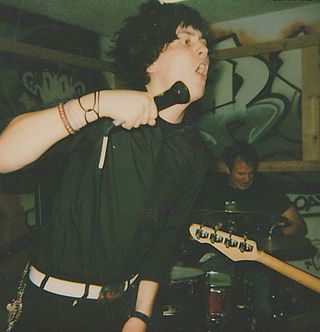
Screamo is an aggressive subgenre of emo that emerged in the early 1990s and emphasizes "willfully experimental dissonance and dynamics". San Diego-based bands Heroin and Antioch Arrow pioneered the genre in the early 1990s, and it was developed in the late 1990s mainly by bands from the East Coast of the United States such as Pg. 99, Orchid, Saetia, and I Hate Myself. Screamo is strongly influenced by hardcore punk and characterized by the use of screamed vocals. Lyrical themes usually include emotional pain, death, romance, and human rights. The term "screamo" has frequently been mistaken as referring to any music with screaming.

American Football is an American midwest emo band from Urbana, Illinois, originally active from 1997 until 2000. They reformed in 2014.
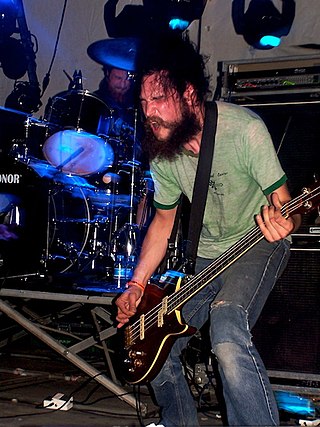
Planes Mistaken for Stars was an American rock band formed in Peoria, Illinois in 1997. Working with several different labels, they released three studio albums and four EPs before breaking up in 2008. While rooted in the post-hardcore and emo scenes of the turn of the century, Planes Mistaken for Stars developed a distinctive musical style strongly influenced by heavy metal and rock and roll. Reuniting for live performances in 2010, they went on to release their fourth album Prey in 2016.

The Appleseed Cast is an American rock band from Lawrence, Kansas. The band was founded in the early days of emo by singer-guitarist Christopher Crisci and drummer Louie Ruiz. The Appleseed Cast has steadily evolved over the release of eight full-length albums with Crisci serving as the main songwriter. The band has a frequently rotating lineup, with Crisci being the only consistent member since their conception. Currently the band's lineup includes Christopher Crisci, Ben Kimball, Nick Fredrickson and Sean Bergman.

Low Level Owl: Volume I is the third full-length album release from Lawrence, Kansas-based band the Appleseed Cast.
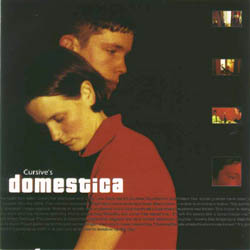
Domestica is the third studio album by the American indie rock band Cursive, released on June 20, 2000. This album was the 31st release by Saddle Creek Records, released on CD as well as both red and black vinyl.
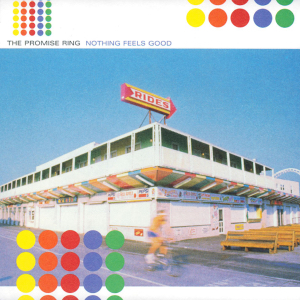
Nothing Feels Good is the second studio album by American rock band the Promise Ring, released on October 14, 1997. The album has gained a cult following, and is frequently regarded as one of the most influential records of the emo genre. The title of the album was used as the name of the book Nothing Feels Good: Punk Rock, Teenagers, and Emo by Andy Greenwald. Original bass player Scott Beschta is credited with writing and playing all the bass parts for the album, although he had been fired by the time the album was released.
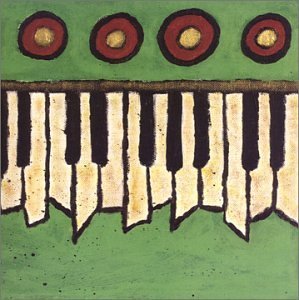
The Ugly Organ is the fourth studio album by American rock band Cursive, released on March 4, 2003, through Saddle Creek Records. It was released both on black and translucent green 180 gram vinyl.
Deep Elm Records is an independent record label releasing albums by bands such as Lights & Motion, The Appleseed Cast, Brandtson, The White Octave, and Planes Mistaken for Stars. It also released the compilation series The Emo Diaries.

"Savory" is the first single released by Jawbox from their 1994 major label debut, For Your Own Special Sweetheart. The song is a description of the female body, according to AllMusic, but in a very cryptic form. The three other songs from the single were later included as bonus tracks for the 2009 reissue of For Your Own Special Sweetheart.
Emo pop is a fusion genre combining emo with pop-punk, pop music, or both. Emo pop features a musical style with more concise composition and hook-filled choruses. Emo pop has its origins in the 1990s with bands like Jimmy Eat World, the Get Up Kids, Weezer and the Promise Ring. The genre entered the mainstream in the early 2000s with Jimmy Eat World's breakthrough album Bleed American, which included its song "The Middle". Other emo pop bands that achieved mainstream success throughout the decade included Fall Out Boy, the All-American Rejects, My Chemical Romance, Panic! at the Disco and Paramore. The popularity of emo pop declined in the 2010s, with some prominent artists in the genre either disbanding or abandoning the emo pop style.
The Emo Diaries is a series of twelve compilation albums released by Deep Elm Records between 1997 and 2011. The series had an open submissions policy and featured mostly acts that were unsigned at the time of the albums' releases. Deep Elm founder John Szuch claims that the original name for the series was intended to be The Indie Rock Diaries, but this was ruled out by the fact that the first volume included Jimmy Eat World and Samiam, who were both signed to major record labels. The Emo Diaries was chosen because The Emotional Diaries was too long to fit on the album cover. Despite the title, the bands featured in the series have a diversity of sounds that do not all necessarily fit into the emo style of rock music. Andy Greenwald, in his book Nothing Feels Good: Punk Rock, Teenagers, and Emo, claims that the series "stake[s] a claim for emo as more a shared aesthetic than a genre":
[T]he bands included hail from all over the world, and the musical styles range from racing punk to droopy, noodley electro. Still, the prevalence of the series—coupled with its maudlin subtitles and manic-depressive tattoo cover art—did much to codify the word "emo" and spread it to all corners of the underground.

American Football, also known retrospectively as LP1, is the debut studio album by American Midwest emo band of the same name, released on September 14, 1999, through Polyvinyl. It was recorded shortly after the band released their debut self-titled EP through Polyvinyl in October 1998. The group, consisting of vocalist/guitarist Mike Kinsella, guitarist Steve Holmes, and drummer Steve Lamos, recorded their debut album at Private Studios in Urbana, Illinois, with production from Brendan Gamble.
The emo revival, or fourth wave emo, was an underground emo movement which began in the late 2000s and flourished until the mid-to-late 2010s. The movement began towards the end of the 2000s third-wave emo, with Pennsylvania-based groups such as Tigers Jaw, Algernon Cadwallader and Snowing eschewing that era's mainstream sensibilities in favor of influence from 1990s Midwest emo. Acts like Touché Amoré, La Dispute and Defeater drew from 1990s emo and especially its heavier counterparts, such as screamo and post-hardcore.

Harmlessness is the second studio album by American indie rock band The World Is a Beautiful Place & I Am No Longer Afraid to Die. It was announced on August 4, 2015, and was released on September 25. The title of the album is a play on the name of the band's first EP, Formlessness.
Midwest emo refers to the emo scene and/or subgenre that developed in the 1990s Midwestern United States. Employing unconventional vocal stylings, distinct guitar riffs and arpeggiated melodies, Midwest emo bands shifted away from the genre's hardcore punk roots and drew on indie rock and math rock approaches. According to the author and critic Andy Greenwald, "this was the period when emo earned many, if not all, of the stereotypes that have lasted to this day: boy-driven, glasses-wearing, overly sensitive, overly brainy, chiming-guitar-driven college music." Midwest emo is sometimes used interchangeably with second-wave emo. Although implied by the name, Midwest emo does not solely refer to bands and artists from the Midwestern United States, and the style is played by outfits across the United States and internationally.

Get Disowned is Hop Along's second full-length album. It was released in March 2012 on Hot Green Records in the US and Big Scary Monsters in the UK/Europe. In 2016 it was reissued by Saddle Creek.












